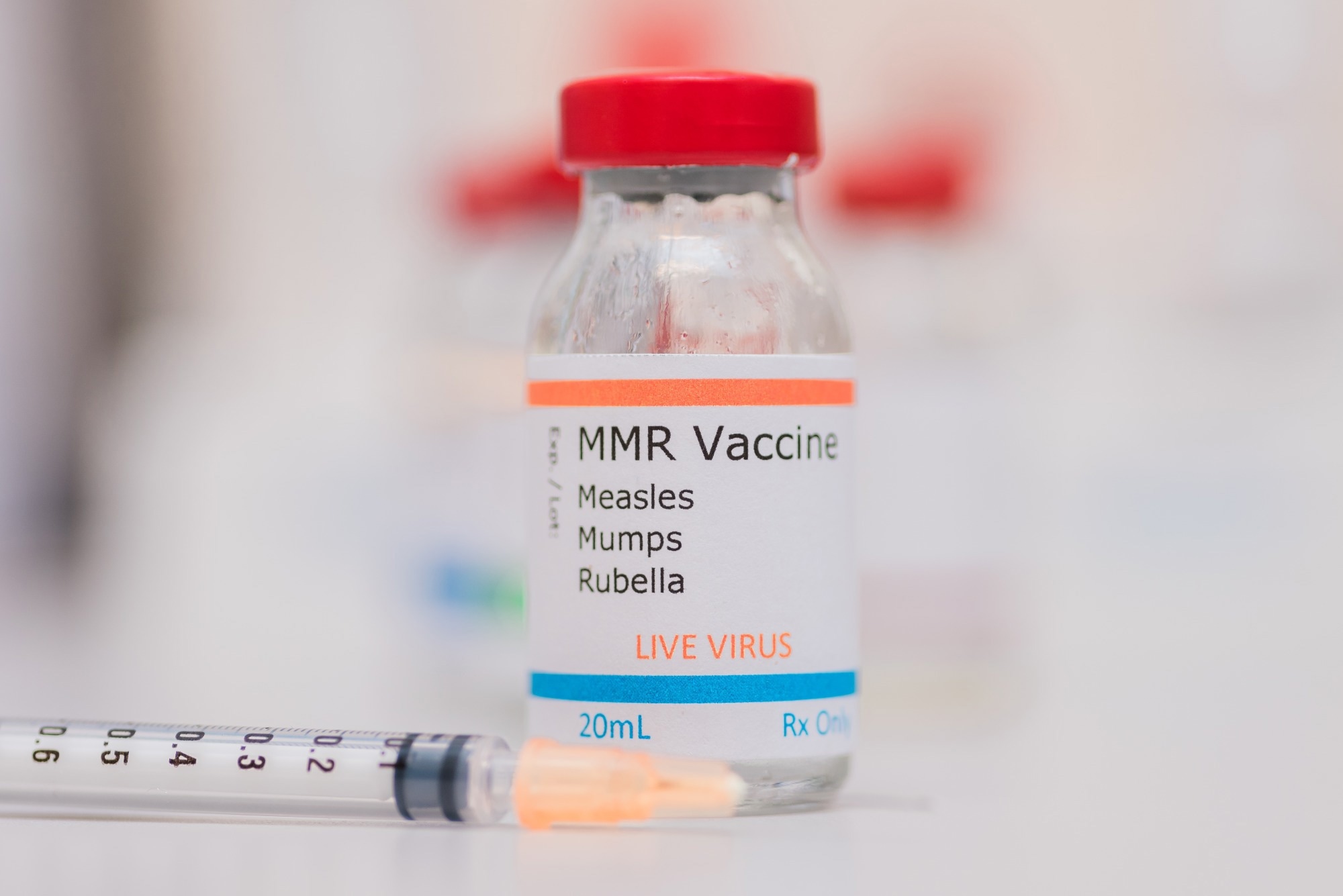In a recent study published in the journal Vaccine, a team of researchers evaluated whether the measles, mumps, and rubella (MMR) vaccine administered to children below the age of two after three doses of diphtheria-tetanus-acellular pertussis (DTaP) vaccine provided any non-specific beneficial effects in reducing the overall number of antibiotic treatments.
 Study: Is vaccination against measles, mumps, and rubella associated with reduced rates of antibiotic treatments among children below the age of 2 years? Nationwide register-based study from Denmark, Finland, Norway, and Sweden. Image Credit: Rohane Hamilton / Shutterstock
Study: Is vaccination against measles, mumps, and rubella associated with reduced rates of antibiotic treatments among children below the age of 2 years? Nationwide register-based study from Denmark, Finland, Norway, and Sweden. Image Credit: Rohane Hamilton / Shutterstock
Background
The MMR vaccine against measles, mumps, and rubella is a live vaccine, which generally consists of attenuated forms of the viruses causing the three diseases. This vaccine is administered to children as early as nine months and is known to provide non-specific protective effects against infections other than these three diseases. Studies from high-income countries have reported that the MMR vaccine has decreased the rate of hospitalizations due to infections not targeted by the vaccine.
Compared to non-live vaccines, such as the ones used to vaccinate against diphtheria, tetanus, and pertussis, the MMR vaccine seems to be more effective at preventing hospitalizations due to non-target diseases. However, most studies investigating the non-specific benefits of the MMR vaccine have focused on diseases or infections severe enough to require hospitalization.
Given that common non-severe infections during childhood are often treated with antibiotics without the need for hospitalization, and lowering the non-vital use of antibiotics is beneficial in decreasing the risk of antibiotic resistance, it is vital to understand the efficacy of the MMR vaccine in decreasing antibiotic treatment rates associated with non-specific infections.
About the study
The present study investigated whether the administration of the MMR vaccine after three doses of the DTaP vaccine was more effective in lowering the antibiotic treatment rates among children below the age of two years as compared to administering just three doses of the DTaP vaccine. This study was conducted in Denmark, Finland, Norway, and Sweden. It included birth cohorts with registered data on children up to the age of two, indicating the inclusion of pneumococcal conjugate and DTaP vaccine in the immunization programs.
The data was obtained from a project that covered sociodemographic and health data from nationwide registries of these Nordic countries. The vaccination data included the date of immunization and the type of vaccine. The information on antibiotic treatments was gathered from prescription records. Furthermore, factors such as birth weight, season of birth, delivery mode, whether the mother smoked during the pregnancy, maternal age, singleton birth, household income, education level of mother, and single parenthood were considered as covariates.
The study followed the children from the age of the recommended MMR vaccine to the age of two years. Furthermore, age was used as the underlying timescale, while vaccination status was considered the time-varying exposure in calculating the hazard ratios of antibiotic treatments.
Results
The results showed that administration of the MMR vaccine after the third dose of the DTaP vaccine lowered the antibiotic treatment rate by 11% on average across the four Nordic countries. Norway showed the highest (16%) reduction in antibiotic use after the administration of the MMR vaccine in children below two years of age with three DTaP vaccine doses. Finland and Denmark reported a reduction of 8%, while Sweden saw a 13% reduction in antibiotic use.
The results did not vary according to the child's sex. However, the adjusted hazard ratios were found to vary significantly with time, with the non-specific beneficial effects of the MMR vaccine being higher towards the beginning of the follow-up and decreasing towards the end. The study also found that the third dose of the DTaP vaccine decreased the antibiotic treatment rates more than the second dose.
The researchers found that the difference in the results between Norway and Sweden, on the one hand, and Finland and Denmark, on the other hand, was because Norway and Sweden reported more timely and higher rates of MMR vaccinations than the other two countries.
The study also discussed potential mechanisms through which the MMR vaccine provided non-specific protection against non-severe infections. The researchers believe that the long-term reprogramming of functional immunity that occurs due to the stimulation of the innate immune system by the live viruses also triggers immune responses against other antigens or stimuli.
Conclusions
Overall, the findings reported that administration of the MMR vaccine in children below two years of age, after immunization with the third dose of the DTaP vaccine, significantly lowered antibiotic use by protecting against non-specific, non-severe infections. However, comparable results were observed in children who received three doses of the DTaP vaccine alone, indicating the need for further studies to better understand the non-specific effects of MMR vaccines.
Journal reference:
- Gehrt, L., Englund, H., Laake, I., Nieminen, H., Möller, S., Feiring, B., Lahdenkari, M., Trogstad, L., Benn, C.S. and Sørup, S. (2024). Is vaccination against measles, mumps, and rubella associated with reduced rates of antibiotic treatments among children below the age of 2 years? Nationwide register-based study from Denmark, Finland, Norway, and Sweden. Vaccine. DOI: 10.1016/j.vaccine.2024.03.026, https://www.sciencedirect.com/science/article/pii/S0264410X2400313X